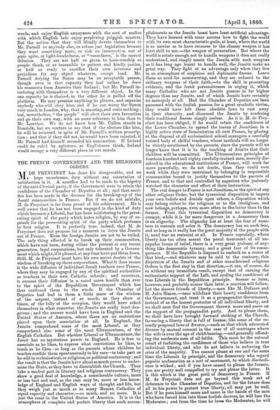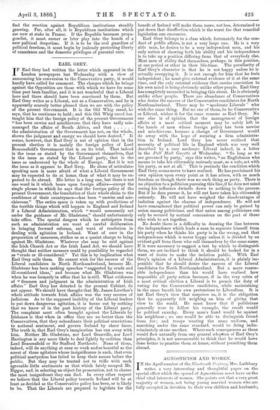THE FRENCH GOVERNMENT AND THE RELIGIOUS ORDERS.
Air DE FREYCINET has done his disagreeable, and we hope unwelcome, duty without any ostentation of satisfaction in it. A sacrifice had to be made to the bigotry of the anti-Clerical party, if the Government were to retain the confidence of the Chamber of Deputies at all ; and that sacri- fice has been made in the decrees for the breaking-up of the Jesuit communities in France. But if we do not mistake, M. de Freycinet is far from proud of his achievement. He is well aware that he has not been engaged in the kind of duty which becomes a Liberal, but has been ministering to the perse- cuting spirit of the party which hates religion, by way of re- prisals for the persecuting spirit of the party which professes to love religion. It is perfectly true, indeed, that M. de Freycinet does not propose for a moment to drive the Jesuits out of France. Even the foreign Jesuits are not to be exiled. The only thing effected is to break up their communities, which have not been, during either the present or any recent generation, legal corporations, but only tolerated by a Govern- ment which might, if it pleased, at any time have put them down. Still, M. de Freycinet must have his own secret doubts of the wisdom of breaking up these corporations. What it does secure is the wide diffusion of individual Jesuit teachers over France, where they may be engaged by any of the spiritual authorities as teachers in their own Catholic schools ; and moreover, it secures their diffusion in a mood more hostile than ever to the spirit of the Republican Government which has thus scattered them to the winds. If the Chamber of Deputies had had in them a little more of the wisdom of the serpent, instead of so much, as they show at times, of the folly of the scorpion, they would have asked themselves in what countries the Jesuits are really least dan- gerous; and the answer would have been in England and the United States of America, where there are no restrictions placed upon their association at all. In England, the Jesuits comprehend some of the most Liberal, as they cemprehend also some of the most Ultramontane, of the English Catholics. But whether Liberal or Ultramontane, the Jesuit has no mysterious power in England. He is free to associate as he likes, to express what convictions he likes, to teach as he likes—so long as the parents whose children he teaches confide them spontaneously to his care—to take part as he will in ecclesiastical, or religious, or political controversy; and the result is that the Jesuits have about as much power to under- mine the State, as they have to disestablish the Church. They take a modest part in literary and religious controversy. They show a good deal of knowledge, a considerable culture, more or less tact and zeal, as the case may be, more or less know- ledge of England and English ways of thought and life, but they weigh just as much as so many Roman Catholics of equal capacity and character,—so much, and no more. It is just the same in the United States of America. It is in the atmosphere of complete and perfect liberty that such accom- plishments as the Jesuits boast have least artificial advantage. They have learned with some success how to fight the world with its own most characteristic guile, at least, where the world is so unwise as to have recourse to the clumsy weapon it has least skill to use,—the weapon of persecution. But where the world is astute enough not to handle weapons it does not really understand, and simply meets the Jesuits with such weapons as it has long ago learnt to handle well, the Jesuits make no great way. They fight at an advantage only when they live in an atmosphere of suspicion and diplomatic finesse. Leave them no need for manceuvring, and they are reduced to the ordinary weapons of their faith,—to the skill in presenting evidence, and the frank persuasiveness in urging it, which many Catholics who are not Jesuits possess in far higher degrees than any Jesuits, and of which Jesuits have certainly no monopoly at all. Had the Chamber of Deputies not been possessed with the foolish passion for a great symbolic victim, they would have left these obsolete laws to rust away in their obscurity, and disarmed the Jesuits by rendering their traditional finesse simply useless. As it is, M. de Frey- cinet has been obliged, if he would retain the confidence of the Lower Chamber, to spread the leaven of Jesuitism in a highly active state of fermentation all over France, by placing at the disposal of all ecclesiastical school managers a carefully trained body of skilful teachers, whose methods will no longer be strictly scrutinised by the parents, since the parents will no longer know that it is to the teaching of Jesuits that their children will be committed. The Ultramontane principles of fourteen hundred and eighty carefully-trained men, secretly dis- solved in the educational institutions of France, will work far more powerfully, we do not doubt, than they could ever work while they were restrained by belonging to responsible communities bound to justify themselves to the parents of France, and to that end controlled by superiors who jealously watched the character and effect of their instruction.
The real danger to France is not Jesuitism, or the spirit of any other religious Order, but the tyrannical disposition to impose your own beliefs and denials upon others, a disposition which may belong either to the religious or to the irreligious, and now belongs, perhaps, even more often to the latter than to the former. From this tyrannical disposition no democracy is exempt, while it is far more dangerous in a democracy than in an oligarchy. The oligarchy has at least the fear of num- bers to restrain and sober it. The democracy has no such fear, and so long as it really has the great majority of the people with it, need fear no restraint at all. In France especially, where liberty has too often meant the penal treatment of all un- popular forms of belief, there is a very great jealousy of any- thing like democratic tyranny, and a great fear of its conse- quences. If the Republic is disposed to embark on a career of that kind,—and whatever may be said to the contrary, this dispersion of the Jesuits and of other unauthorised religious Orders is the first step in that direction,—it can, of course, do so without any immediate result, except that of earning the enthusiastic support of the Left, and cooling the confidence of true Liberals in the Republican principle. Sooner or later, however, and probably sooner than later, a reaction will follow. Let the sincere friends of liberty,—men like M. Dufaure and M. Jules Simon,—once withdraw their hearty confidence from the Government, and treat it as a propagandist Government, instead of as the honest protector of all individual liberty, and we shall soon find the Government thrown more and more on the support of the propagandist party. And to please them, we shall have laws brought forward striking at the Church, favouring a liberty that is full of license, like some of the re- cently proposed laws of divorce,—such as that which advocated divorce by mutual consent in the case of all marriages where the wife is over the age of child-bearing,—and generally offend- ing the moderate men of all faiths. This must be the natural result of forfeiting the confidence of those who believe in true individual liberty, and who do not believe in enforcing the cries of the majority. You cannot please at one and the same time the Liberals by principle, and the democracy who regard popular acclamation as a sort of sacrament, to which disobedi- ence is wicked ; and if you have ceased to please the former, you are pretty well compelled to try and please the latter. It is this which is the great peril of democracy in France. If M. de Freycinet does not go beyond this weak act of deference to the Chamber of Deputies, and for the future does all in his power to protect true liberty, all may yet be well. But if he puts himself more and more in the hands of the men who have forced him into these foolish decrees, he will lose the Moderates ; and from the time he loses the Moderates, he will find the reaction against Republican institutions steadily growing. For, after all, it is Republican institutions which are now at stake in France. If the Republic becomes propa- gandist, it must, sooner or later play into the hands of a new political despotism. If it is to be the real guardian of political freedom, it must begin by jealously protecting liberty of conscience and the domestic privileges of parental care.



































 Previous page
Previous page